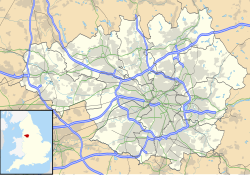St Margaret's Church, Burnage
| St Margaret's Church, Burnage | |
|---|---|
| 53°25′51″N 2°12′06″W / 53.4309°N 2.2018°W | |
| OS grid reference | SJ 867 927 |
| Location | Burnage, Manchester |
| Country | England |
| Denomination | Anglican |
| Churchmanship | Conservative Evangelical |
| Website | St Margaret, Burnage |
| History | |
| Status | Parish church |
| Consecrated | 15 March 1875 |
| Architecture | |
| Functional status | Active |
| Heritage designation | Grade II |
| Designated | 9 February 2012 |
| Architect(s) | Paley and Austin |
| Architectural type | Church |
| Groundbreaking | 1874 |
| Completed | 1926 |
| Specifications | |
| Materials | Sandstone |
| Administration | |
| Province | York |
| Diocese | Manchester |
| Archdeaconry | Manchester |
| Deanery | Manchester North & East |
| Parish | St Margaret, Burnage |
| Clergy | |
| Rector | Revd Matthew Calladine |
| Laity | |
| Reader(s) | Pearl Hardy, Peter Miller, Peter Capon |
| Churchwarden(s) | Jane Franklin, Chris Rogers |
St Margaret's Church is in Burnage Lane, Burnage, a neighbourhood of Manchester, England. It is an active Anglican parish church in the deanery of Heaton, the archdeaconry of Manchester, and the diocese of Manchester.[1] It is recorded in the National Heritage List for England as a Grade II listed building, having been designated on 9 February 2012.[2]
History[edit]
The church was built in 1874–75 and designed by the Lancaster partnership of Paley and Austin.[3] It was consecrated on 15 March 1875 by the Bishop of Manchester.[4] It initially consisted of a three-bay nave, a chancel and a south aisle, providing seating for about 200 people. The site for the church was given by Lord Egerton of Tatton Park.[5] In 1881–82 the same architects added the bellcote,[6] followed by the clergy vestry, a reredos and the organ screen in 1885.[7] In 1901 the successors in the practice, Austin and Paley added the north aisle at a cost of £3,000 (equivalent to £350,000 as of 2021).[8][9] Further work was carried out on the west end of the church by the same practice in 1925–26, and a baptistry, and two porches were added.[10] In 1998 the oak pulpit and choir stalls were removed, and the pews were replaced by chairs.[4]
Architecture[edit]
St Margaret's is constructed in sandstone.[4] Its plan consists of a three-bay nave, north and south aisles, a south porch, a baptistery, and a chancel.[3] The architectural style is Decorated.[11] In the Buildings of England series, the authors describe the interior as "well-proportioned", and with a "single-framed roof".[3] The reredos dates from 1885. The memorials to the World Wars have been designed to match the reredos; the inscriptions are on small tiles, separated by gold mosaic. The stained glass includes a window in the south aisle dated 1894 depicting Faith, Hope and Charity. In the south wall of the chancel is a window dating from about 1920 by Walter J. Pearce, and in the east of the south aisle is a window from about 1950 by T. F. Wilford. Also dating from 1950 is a window in the baptistery depicting Scouts, Guides, Cubs and Brownies.[3] The two-manual organ was built by George Sixsmith and Son in 1973.[12] It replaced an earlier three-manual organ.[13]
See also[edit]
References[edit]
- ^ St Margaret, Burnage, Church of England, retrieved 24 July 2011
- ^ Historic England, "St Margaret's Church and War Memorial Lych Gate, Burnage (1407271)", National Heritage List for England, retrieved 14 February 2012
- ^ a b c d Hartwell, Hyde & Pevsner 2004, pp. 409–410.
- ^ a b c Church History, St Margaret's Church, Burnage, retrieved 24 July 2011
- ^ Brandwood et al. 2012, p. 228.
- ^ Brandwood et al. 2012, p. 232.
- ^ Brandwood et al. 2012, p. 235.
- ^ UK Retail Price Index inflation figures are based on data from Clark, Gregory (2017). "The Annual RPI and Average Earnings for Britain, 1209 to Present (New Series)". MeasuringWorth. Retrieved 11 June 2022.
- ^ Brandwood et al. 2012, p. 244.
- ^ Brandwood et al. 2012, p. 251.
- ^ Price 1998, p. 81.
- ^ "NPOR [N09330]", National Pipe Organ Register, British Institute of Organ Studies, retrieved 29 June 2020
- ^ "NPOR [N02427]", National Pipe Organ Register, British Institute of Organ Studies, retrieved 29 June 2020
Bibliography[edit]
- Brandwood, Geoff; Austin, Tim; Hughes, John; Price, James (2012), The Architecture of Sharpe, Paley and Austin, Swindon: English Heritage, ISBN 978-1-84802-049-8
- Hartwell, Clare; Hyde, Matthew; Pevsner, Nikolaus (2004), Lancashire: Manchester and the South-East, The Buildings of England, New Haven and London: Yale University Press, ISBN 0-300-10583-5
- Price, James (1998), Sharpe, Paley and Austin: A Lancaster Architectural Practice 1836–1942, Lancaster: Centre for North-West Regional Studies, ISBN 1-86220-054-8

